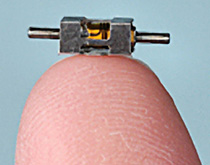
David Henderson is looking to leave his job. It's the dotcom bust era, and his company is shrinking. Despite the risk, despite the bad news in the economy, despite jobs being scarce, he resigns. "It was time for me to leave," he says simply. But he avoids joining the ranks of other agile-thinking displaced workers looking to be hired. In the uncertain times not long after 9-11, he manages to convince a small group of engineers to take a leap of faith. He asks them to work—not with him, but for him. His company has no product. All he has is an idea. And like he says, "Ideas are cheap."
They need to be. For months and months, the first employees of his company, New Scale Technologies, work with nominal salaries. They're willing to do it because Henderson's idea seemed full of potential from the first time he described it to one of his new employees. "I moved my hands a lot," recalls Henderson, "and within a minute, [my employee] said, 'I know what to call it.'"
Like an entrepreneurial cliché , the engineers toil in Henderson's basement making Squiggle, a micro electric motor. The first parts come out of the oven. As an undergraduate at Carnegie Mellon, Henderson (E'83, TPR'91) made racing buggies faster and lighter for Beta Theta Pi. Now he is all about making this motor smaller and more powerful. His brain child certainly is tiny. The "rough draft" version is about as big as a person's thumb. It has very few parts, just actuators and a very tiny screw and nut, but it can exert several pounds of force.

In January 2004, a press release announces New Scale Technologies and its product, Squiggle. By August, Henderson is on a plane to Korea to visit the Samsung headquarters. "I hadn't thought of cameras," he says, "I was thinking medical research." But Squiggle is what Samsung wanted, a very small motor that could power a cell-phone camera and still allow the phone to be sleek and pocket sized.
Since empowering the world of wireless camera phones, Squiggle has become smaller and smaller. Now it's the size of a grain of rice, which makes it feasible for use in implantable medical devices like insulin pumps. Henderson hopes that one day the Squiggle can power an artificial pancreas that dispenses insulin for people who, like himself, have diabetes. It already powers a motorized version of the HeartLander miniature robot that is being developed to perform heart surgery [see January 2009 feature story "One Small Step, One Giant Leap"]. There have been more and more inquiries for Squiggle to do all varieties of tasks, Henderson says, from moving bait on fishing lure to powering electronic locks, lasers, defense equipment, and aerospace applications.
Thanks to Squiggle, employees at New Scale Technologies get more than nominal paychecks. The seven-year-old, New York-based company has been ranked by Inc. magazine in the top 15% of the 5,000 fastest-growing private companies in the United States.
—Michelle Bova (HS'07)



